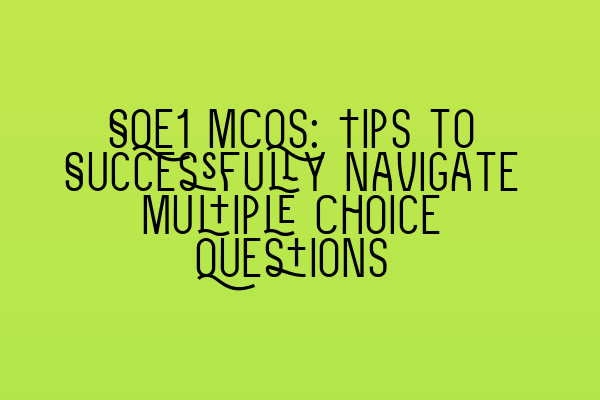Are you preparing for the SQE1 exam and feeling overwhelmed by the multiple-choice questions (MCQs) that are a part of the assessment? Don’t worry, you’re not alone! Many aspiring solicitors find MCQs challenging, but with the right approach and preparation, you can navigate them successfully. In this blog post, we will provide some valuable tips to help you tackle SQE1 MCQs and maximize your chances of success.
1. Understand the Structure of SQE1 MCQs
Before delving into the tips, it’s crucial to understand how SQE1 MCQs are structured. Each MCQ will consist of a question followed by several answer options. You will be asked to select the most appropriate answer(s) from the given options. Some MCQs may have a single correct answer, while others might have multiple correct answers that need to be selected.
It’s essential to read the question and answer options carefully and analyze them before making your selection. Pay attention to keywords, phrases, and any qualifying statements that can help you identify the correct answer.
2. Practice with SQE1 Mock Tests
One of the best ways to improve your performance in MCQs is through consistent practice. Take advantage of interactive SQE mock tests for Property to sharpen your skills and familiarize yourself with the format and types of questions you may encounter in the real exam.
Mock tests not only allow you to gauge your understanding of the subject matter, but they also help you become comfortable with the time constraints. Set aside regular practice sessions and aim to simulate exam conditions as closely as possible to enhance your confidence and efficiency.
3. Develop Effective Time Management Strategies
Time management plays a vital role in performing well in any exam, and SQE1 is no exception. Since you will have a limited amount of time to complete the MCQ section, it’s crucial to allocate your time wisely.
Start by quickly skimming through all the questions to get an idea of the level of difficulty and the number of questions. Identify the ones that you believe you can answer confidently, and leave the more challenging ones for later. This initial scan will help you prioritize your time and focus on the questions you have a higher chance of answering correctly.
When answering the questions, avoid spending too much time on a single question. If you’re unsure about an answer, make an educated guess and mark it for review if necessary. Remember, unanswered questions are guaranteed to be incorrect, so it’s better to provide an answer, even if it’s just an educated guess.
4. Break Down Complex Questions
Sometimes, MCQs can be worded in a complex or convoluted manner, making it difficult to understand what is being asked. To tackle such questions, break them down into smaller, more manageable parts. Identify the keywords and phrases that are vital to answering the question. By deconstructing the question, you can eliminate any distractions and focus on finding the correct answer.
5. Use Process of Elimination
If you’re unsure about the correct answer, try using the process of elimination. Go through each answer option and eliminate the ones that you know are incorrect. This strategy can help narrow down your choices and increase the likelihood of selecting the correct answer.
6. Pay Attention to Negatives and Qualifiers
Be cautious when encountering questions with negative phrasing or qualifiers such as “EXCEPT” or “NOT.” These terms can easily change the meaning of the question, so read them carefully. Highlight or underline these keywords to ensure you don’t miss any important information.
7. Review and Reflect on Incorrect Answers
After completing a set of MCQs, take the time to review and understand the reasoning behind the correct answers. Additionally, reflect on the reasons for your incorrect answers. This practice will help you identify any knowledge gaps or misconceptions that need to be addressed. Use essential tips and resources for success in Property Practice to reinforce your understanding of key topics.
Conclusion
Successfully navigating SQE1 multiple-choice questions requires a combination of subject knowledge, critical thinking, and effective time management. By understanding the structure and format of MCQs, practicing with mock tests, and implementing smart strategies, you can boost your confidence and improve your performance on exam day.
Remember to remain calm, stay focused, and trust in your preparation. With consistent effort and the right approach, you can conquer SQE1 MCQs and move closer to your goal of becoming a qualified solicitor.

Leave a Reply